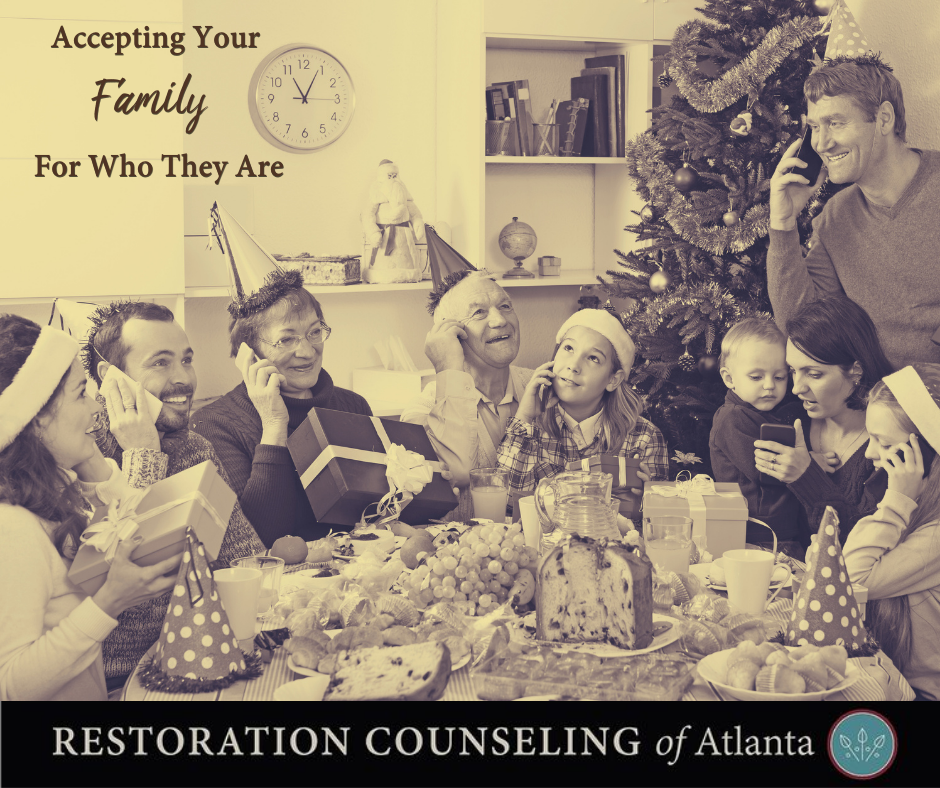With the upcoming holidays, you’re probably thinking a lot about your family (parents, caretakers, and siblings). You’re probably anticipating spending time with your family. Maybe you’re excited, or quite possibly, you are dreading it.
I find that something happens in our 20s, 30s, or 40s. We begin to notice the cracks in our family. Or maybe we always noticed them, but they begin to bother us more. As we start our own lives or begin our own families, we realize that we don’t want to take some of the old patterns into our new lives. It may run even deeper than that though. Your family history may involve abuse, neglect, or substance abuse.
Some of you may have a family history that involves so much abuse or neglect that you have had to cut ties with family members – please know that this article is not a call to simply reconnect and accept abusive behavior. Your journey may look different.
If you are still in contact with your family but are having a hard time knowing how to accept what’s difficult and enjoy the good things about your family, this article is for you.
Accepting is not…
Before I talk about how to accept your family, I need to make sure we know what it is not. Accepting does not mean that you agree with everything your family does or says, or that you raise a white flag to any unhealthy patterns you no longer want to take part in. Accepting also does not mean that you are happy with your family always and forever, amen.
Accepting is…
Oxford Languages defines accept as “consent to receive (a thing offered).” Accepting is a definitive act in which you allow yourself to feel the full range of emotions about your family while remaining both autonomous and in a healthy relationship with your family members.
How to become more accepting of your family…
- Identify both what it is that you appreciate about your family and what has frustrated or hurt you.
- Grieve the hurt or frustration from your family that has caused you pain. Acknowledge the pain and let it be what it is. You can even express it to your family or a particular family member if that will help you have a little more freedom.
- Stop trying to get your family to respond or be the way you want them to be. This might sound harsh, and I certainly don’t want to sound like a pessimist! But sometimes we spend so much time attempting to control our family members that we don’t have time to help ourselves – which is the only person we do have some control over.
- Connect to the common experience of family being difficult. In other words, don’t compare your family to other families. It’s easy to see the outside and think that everyone else has it together. Don’t get me wrong, there is certainly a spectrum of difficulty in families and I don’t want to take away from your pain. But try to notice and catch yourself if you have a consistent pattern of thinking that other families are better or easier than yours.
- Draw boundaries where necessary. Accepting your family doesn’t mean allowing them to do whatever they want. If there are areas of your life where you are saying yes to your family too much or for unhealthy reasons, learn your limits and how to say no.
- Find the good in your family and enjoy it. Sometimes when we are hurt or frustrated by our family, it’s all we can see. But my guess is that there is a reason why you stay in relationship with your family. Find those reasons to find the joy in your relationships with your family.
Accepting is a journey…
It won’t happen overnight, nor will it happen necessarily in the order that I wrote above. Accepting your family is about freeing yourself from the mental burden of constantly attempting to change things that are out of your control. I wish you all the best as you walk through this season with whatever your family experience may be. As always, please don’t hesitate to reach out to us if you think it would be helpful to talk through this with an experienced therapist.
 Written by Ashley Skinner, MA, APC
Written by Ashley Skinner, MA, APC
Woodstock Location
ashley@restorationcounselingatl.com ext 119
Ashley takes a multi-theory approach to psychotherapy. This allows her to take the whole person into account – mind, body, and soul. Her emphasis is on Cognitive-Behavioral Therapy, Narrative Therapy, and mindfulness techniques. She works with individuals ages 18 and up, dealing with anxiety and/or depression, postpartum anxiety and/or depression, trauma, abuse, life transitions, self-esteem issues, and grief.

